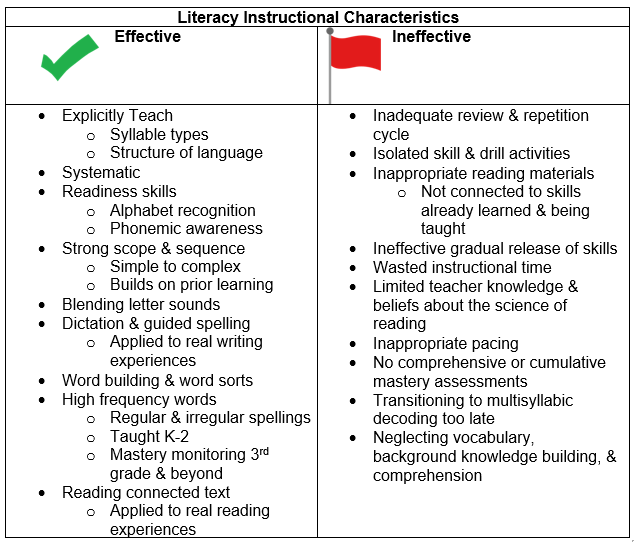
Transforming Practices Into Literacy
By Mary Stowe, M.Ed. and Elizabeth Auguste, Ph.D.
————————————————————————————————————

Transformative Literacy Leadership
By Cathy Buyrn, M.Ed.
In November of 2020, the Link Lines Administrator’s Corner addressed Literacy Leadership at the IEP Meeting. Administrators play a central role in reframing approaches to operationalizing the literacy curriculum for students with disabilities and other students who struggle to develop critical literacy skills. School leaders should monitor specially designed instruction for students with disabilities as well as the instructional practices of general education teachers focused on developing the literacy skills of all students. Administrators should help teachers replace practices proven to be ineffective with evidence-based practices “grounded in the science of reading” (Lane, 2021, p. 1).
Teachers may be attached to practices of habit that have been proven ineffective and may need guidance, support, and coaching to shift to evidence-based practices proven to be effective and efficient with all learners. Administrators should work with teachers to eliminate ineffective practices and establish more effective methods, and this expectation should be non-negotiable. Ineffective instructional practices only exacerbate academic inequities. Instructional leaders can be on the lookout for characteristics of effective literacy instruction and red flags of ineffective literacy practices (see Table 1) established by the International Literacy Association (ILA, 2019).
Table 1
Effective and Ineffective Literacy Instructional Characteristics

Note. Adapted from ILA, 2019, pp. 3-9.
School leaders should prioritize the assignment of literacy resources based on specific student achievement gap data. Once school resources are in place, administrators should engage in cycles of curriculum reframing focused on closing literacy achievement gaps and inclusivity. Inclusive curriculum reframing should include considerations for:
- Student and Family Engagement
- Data-Driven Reflection
- Deeper Learning Alignment
- High Quality Instructional Resources
- Student Voice
Curriculum reframing driven by a literacy lens should focus on deeper learning and high-quality instructional resources. It is in these two areas that ineffective practices of habit should be replaced by evidence-based practices. There is no greater equalizer or worthwhile curriculum goal than independent literacy. Courageous school leaders can use student outcome data to make literacy achievement gaps visible and help teachers see the need to adopt more effective, inclusive, and efficient literacy practices (VDOE, 2020). It may be challenging to help teachers embrace new methods and let go of much-loved practices of habit, but administrators need to facilitate a move from ineffective to effective literacy practices. Improved student outcomes will inform continuous cycles of reflection and prepare students “for successful, healthy, and fulfilling lives” (Virginia Board of Education, 2017, p. 10).
Administrators can point teachers towards the educator’s lesson in the December 2021 Link Lines edition Transforming Practices in Literacy focused on replacing specific ineffective practices with evidence-based practices.
Additional examples of evidence-based literacy practices across content areas and grades K-12 can be found at the Virginia Department of Education’s website.
English Professional Development Packages: Development on Demand
References
International Literacy Association. (2019). Meeting the challenges of early literacy phonics instruction [Literacy leadership brief]. https://www.literacyworldwide.org/docs/default-source/where-we-stand/ila-meeting-challenges-early-literacy-phonics-instruction.pdf
Lane, J. (2021, June 17). Changes to code of Virginia § 22.1-253.13:1 kindergarten through grade 3; reading intervention services for certain students [Memorandum]. Virginia Department of Education. https://www.doe.virginia.gov/administrators/superintendents_memos/2021/162-21.pdf
Virginia Board of Education. (2017). Virginia Board of Education comprehensive plan: 2018-2023. https://www.doe.virginia.gov/boe/plan/comprehensive-plan.pdf
*Virginia Department of Education. (2020). Navigating EdEquityVA: Virginia’s road map to equity. Office of Equity & Community Engagement. http://www.virginiaisforlearners.virginia.gov/edequityva/
*This resource was rescinded by the Virginia Department of Education on February 9, 2022.




